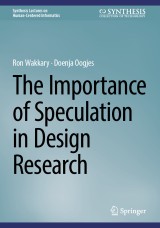Details

The Importance of Speculation in Design Research
Synthesis Lectures on Human-Centered Informatics
|
CHF 34.00 |
|
| Verlag: | Springer |
| Format: | |
| Veröffentl.: | 23.08.2024 |
| ISBN/EAN: | 9783031670954 |
| Sprache: | englisch |
Dieses eBook enthält ein Wasserzeichen.
Beschreibungen
<p>This book explores speculation in design research in the field of human-computer interaction (HCI). The authors reveal how speculative reasoning in design research increases the capacity of HCI to address a wider array of social and research challenges. Speculation in design research employs (1) leaps of imagination, (2) diverse ways of knowing or epistemologies, (3) ethical reflexivity, (4) and makes alternate possibilities experiential. This book shows how each can be productively and critically applied together through existing, emerging, and new research approaches in HCI. The aim of this book is to generously see speculation as more than a form of critique or genre of design research, to instead be seen as broadly central to the material investigations that govern much of the field. In doing so, the book aims to expand the potential role of speculation in HCI and shows how speculation is applicable to a wide range of research goals, which, in turn, creates research approaches in new directions. In expanding the approach and methodology of speculation in HCI, the books draw inspiration from other disciplines and intersectional perspectives. By examining current, emerging, and possible new forms of speculation methods, this book will be of interest to undergraduate and graduate students in HCI as well as seasoned researchers and practitioners. </p>
<p>Why Speculate?.- Continuous Future.- Continuous Present.- Continuous Pasts.- The Practice of Speculative Reasoning.- Conclusion.</p>
<p><strong>Ron Wakkary</strong> is a professor in design in the School of Interactive Arts and Technology, Simon Fraser University in Canada and a professor and Chair of Design for More Than Human-Centered Worlds in the Future Everyday Cluster in Industrial Design, Eindhoven University of Technology in the Netherlands. He founded the SFU Everyday Design Studio. Wakkary holds a BFA in Visual Arts from Nova Scotia College of Art and Design, Canada, an MFA in Visual Arts from the State University of New York, USA, and an Ph.D. in Human-Computer Interaction (HCI) from the University of Plymouth, UK. His research interests revolve around the changing nature of design and HCI in relation to evolving understandings of human–technology relations and posthumanism.</p>
<p><br>
<strong>Doenja Oogjes</strong> is a design researcher in Human-Computer Interaction. She is an assistant professor at the Department of Industrial Design at Eindhoven University of Technology (TU/e) in the Netherlands. Oogjes earned her Ph.D. from Simon Fraser University (SFU), Vancouver, Canada, and holds a B.Sc. and M.Sc. in Industrial Design from the University of Technology, Eindhoven, the Netherlands. She is interested in indirect, accidental, surprising, and overlooked ways designed things mediate the every day, informed by feminist posthumanism. </p>
<p><br>
<strong>Doenja Oogjes</strong> is a design researcher in Human-Computer Interaction. She is an assistant professor at the Department of Industrial Design at Eindhoven University of Technology (TU/e) in the Netherlands. Oogjes earned her Ph.D. from Simon Fraser University (SFU), Vancouver, Canada, and holds a B.Sc. and M.Sc. in Industrial Design from the University of Technology, Eindhoven, the Netherlands. She is interested in indirect, accidental, surprising, and overlooked ways designed things mediate the every day, informed by feminist posthumanism. </p>
<p>This book explores speculation in design research in the field of human-computer interaction (HCI). The authors reveal how speculative reasoning in design research increases the capacity of HCI to address a wider array of social and research challenges. Speculation in design research employs (1) leaps of imagination, (2) diverse ways of knowing or epistemologies, (3) ethical reflexivity, (4) and makes alternate possibilities experiential. This book shows how each can be productively and critically applied together through existing, emerging, and new research approaches in HCI. The aim of this book is to generously see speculation as more than a form of critique or genre of design research, to instead be seen as broadly central to the material investigations that govern much of the field. In doing so, the book aims to expand the potential role of speculation in HCI and shows how speculation is applicable to a wide range of research goals, which, in turn, creates research approaches in new directions. In expanding the approach and methodology of speculation in HCI, the books draw inspiration from other disciplines and intersectional perspectives. By examining current, emerging, and possible new forms of speculation methods, this book will be of interest to undergraduate and graduate students in HCI as well as seasoned researchers and practitioners. </p>
<p>In addition, this book:</p>
<ul>
<li>Traces the emergence of speculative design, design fiction, and critical design and its impact on HCI</li>
<li>Turns critical attention of speculation toward the present rather than future to create new empirical ways of knowing</li>
<li>Outlines potential of centering speculation in HCI for greater flexibility in addressing diverse and urgent challenges</li>
</ul>
<p>In addition, this book:</p>
<ul>
<li>Traces the emergence of speculative design, design fiction, and critical design and its impact on HCI</li>
<li>Turns critical attention of speculation toward the present rather than future to create new empirical ways of knowing</li>
<li>Outlines potential of centering speculation in HCI for greater flexibility in addressing diverse and urgent challenges</li>
</ul>
Shows how speculation can create new ways of knowing and address diverse and urgent challenges Reinterprets speculative design, design fiction, and critical design as central to design research in HCI Develops a framework for speculative reasoning and offers strategies and methods to use speculation across HCI

















